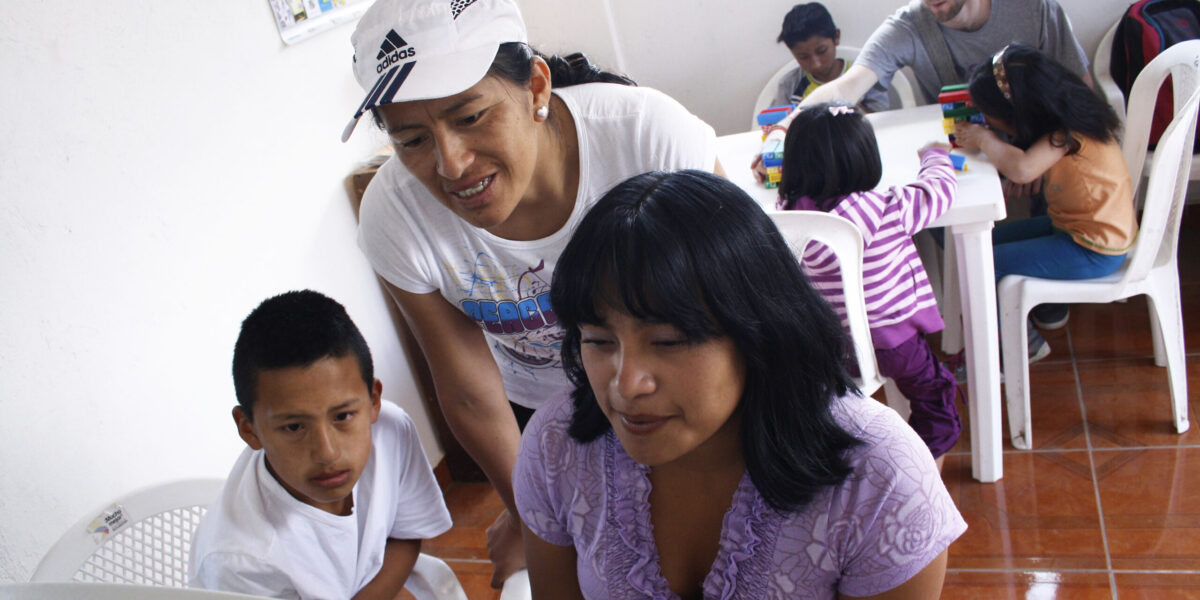The fifth man that David Shenk interviewed one typical morning in Quito, Ecuador, came into his office just like all the other Colombian expatriates he saw daily.
As José Martinez discussed his situation, Shenk asked him what work he did in Colombia. The man opened his jacket and displayed a T-shirt that had a picture of a clown and said, “Ecopayaseando por la tierra” (“eco-clowning for the world”).
Shenk wrote in his blog post that his heart skipped a beat because he recognized the logo from a Witness for Peace delegation he traveled with to Colombia.
“I met you in Colombia,” Shenk said. “You were at a [community organizing] meeting that I attended. Our group wore blue T-shirts and you gave me a free DVD of your clown show.”
Martinez remembered Shenk and remarked about how thankful he was to see a familiar face. The tone of their conversation changed after that because they were elated by feelings of joy, said Shenk.
In Colombia, the man had also been a community activist. Due to his work with the displaced population and with the local police force, he got into trouble. When his life was threatened, he escaped to Ecuador. Now, the refugee project will accompany him as he builds a new life in Ecuador.
Shenk coordinates the Colombian Refugee Project, serving with Mennonite Mission Network and Virginia Mennonite Missions. The project helps families from Colombia as they start new lives in Ecuador and face prejudice, poverty and persecution.
Ministry beginnings
This ministry of the Quito Mennonite Church started after César Moya and his wife and co-pastor, Patricia Urueña, began to receive a lot of Colombian refugees at their church. The refugees often had to leave Colombia due to drug violence, threats, or land displacement. Some of them struggled to get their feet on the ground in a new country, so in 2002, the church began providing food, blankets and mats for the refugees. Now the church also helps with microloans, housing, and applying for asylum.
Two years earlier when the Moya Urueña couple was sent to Ecuador from Colombia, their mission assignment was to offer theological and leadership training for indigenous churches. However, their eyes were open to the opportunities God presented, and the project has helped 2,500 families in 11 years.
“The ministries of Ecuador are an expression of the love of God for the weakest in our society: the indigenous, abandoned children, people in poor neighborhoods, and refugees escaping violence,” wrote Moya and Urueña.
Many projects, from peace education to teenage pregnancy prevention, developed from the Moya Urueñas’ flexibility to adjust their plan and work with the church to develop programs to respond to the needs around them.
Network of support
Behind the Moya Urueña couple, who plan to return to Colombia in 2014 after 14 years of ministry in Ecuador, is a web of support from the Ecuador Partnership that initiated the mission in Ecuador in 2000.
Mennonite Mission Network, Iglesia Cristiana Menonita de Colombia (Colombia Mennonite Church), and Central Plains Mennonite Conference each bring different gifts that further the mission in Ecuador and in the communities of the partners.
Although the logistical know-how, the cultural expertise, and the financial assistance are all vital parts to the success of the collaboration in Ecuador, the relationships formed through the experience enrich the mission and keep energy high among the partners.
Representatives from the partners meet regularly and facilitate trips that have allowed youth group members, lay people, and church leaders to understand each other better by sharing meals and conversations in all of the three countries represented. Two types of tours go to Ecuador: fellowship and learning tours, which focus on experiencing the culture, and fellowship and work tours, which offer construction labor for ministry projects.
Building relationships
Keshia Littlebear, from White River Cheyenne Mennonite Church in Montana, participated in a fellowship and learning tour in 2010. The most meaningful part of the trip for her was the opportunity to meet with the Quichua community in the Andean mountain town of San Antonio.
During their brief stay in the village, Littlebear saw the commonalities between the culture of this indigenous community and her own Cheyenne community in Montana.
“It was interesting to see all those similarities,” said Littlebear. “An example was their hospitality. They gave lots of hospitality for those invited into the church.”
Although Littlebear visited Ecuador three years ago, the relationships that she established during that trip continue to this day. In 2011, a group from Ecuador came to visit the United States and she hosted some of them in her home.
“[When they visited,] it felt like seeing family again for a holiday,” said Littlebear. “We still keep in touch through social media.” Doyle Roth of Central Plains Conference helps organize the regular fellowship and work teams, and sees the transformation people go through when they work with the Ecuadorians and Colombians. Roth invests lots of effort to ensure that the work teams only go when the Ecuadorian church already has projects they could use help with. He reminds work teams, many of whom have extensive experience in building, that the Ecuadorian project leaders are in charge of construction. Roth emphasizes that in Ecuador the North Americans are to work as they are instructed and not try to impose the United States way of construction work.
“The work projects are not the most important part of the trip; it’s the relationships,” said Roth. “[The U.S. American, Colombian and Ecuadorian workers] really get to know each other just by rubbing elbows. They can work all day long and not say a word because they can’t speak each other’s language, but they can still form relationships by working together.”
Littlebear says that being involved in the partnership has helped her church feel more connected to the global church. The White River congregation is small, and the visits build relationships and involvement, she said. Her church’s increased involvement in denominational activities led a large group from her church to attend Mennonite World Conference in Paraguay in 2009.
The Ecuador churches also benefit from the connection to the global church. Moya and Urueña said that when the leaders from Ecuadorian churches visit Colombia and the United States, they get the chance to see how they are part of something bigger, and better understand the dynamics of churches in other countries—their leadership styles, internal and external conflicts, culture and history.
Looking ahead
As the Ecuador Partnership matures, the partners are planning for the future. Two couples will finish their terms as mission workers early this year. The Moya Urueña couple is hopeful that in the next two years, all three of the Mennonite churches in the Quito and Riobamba area will have licensed pastors. These new pastors are currently getting theological training through PROPAZ.
“Working with [the Ecuador Partnership] has challenged members of the churches to serve in other contexts and to put their resources toward the kingdom of God,” said the Moya Urueñas. “The partnership helped some people discover administrative and pastoral gifts, and it expanded the vision of the churches and awoke in us a desire to walk in solidarity with those who suffer.”








